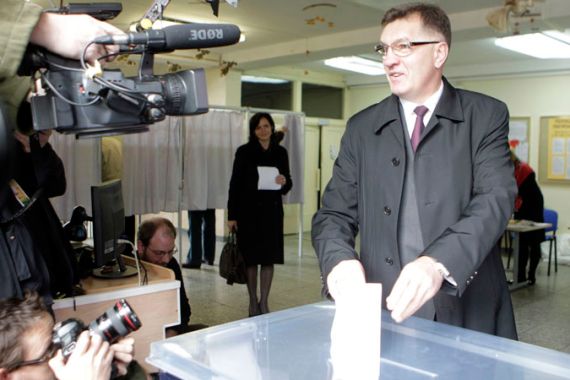Centre-right evicted in Lithuania elections
Opposition parties pledge to form coalition but president blocks Labour Party participation over vote-buying concerns.

Lithuania’s left-wing and populist opposition are planning to form a coalition government after the austerity-weary Baltic state became the latest European nation to evict the centre-right at the ballot box.
But in a move apparently blocking the three-party coalition plans, President Dalia Grybauskaite said on Monday she did not want the Labour Party to be in the new government after allegations of vote buying and tax evasion.
Grybauskaite, who has the job of formally choosing a new prime minister, said that the party – the third biggest in parliament after the ballot – was not a suitable coalition candidate due to the allegations, which emerged after two rounds of voting.
“A party that during an election is suspected of being at the root of the largest number of cases of electoral fraud, which is suspected of tax fraud and the leaders of which have been charged in a criminal investigation cannot be involved in forming a government,” Grybauskaite said.
“I will only back a political grouping that can form a majority government without Labour, which is in the dock.”
Labour Party leader Viktor Uspaskich is on trial for alleged tax fraud by his party in 2004-2006, which he denies
The tree parties won a combined 79 seats in the country’s 141-member parliament in Sunday’s vote.
Algirdas Butkevicius, leader of Labour’s allies the Social Democrats and the man widely tipped to become prime minister, said he was surprised by Grybauskaite’s announcement.
“We’ll be looking for the best outcome for Lithuania,” he added.
Leaders of the Social Democrats, the left-wing Labour party and right-wing Order and Justice movement begun informal coalition talks already after the left topped a first round of polling on October 14.
Euro debate
The alliance headed by Butkevicius has said it would aim to roll back many of the spending cuts imposed in the previous government’s “austerity package”, increasing the minimum wage, reforming the tax system and boosting investment – while being fiscally responsible and sticking to the outgoing government’s budget deficit goals.
During campaigning, the three parties said Lithuania should not rush to adopt Europe’s single currency during the sovereign debt crisis.
 |
| Lithuania is one of the EU’s poorest countries and the population is shrinking as thousands leave to find work[EPA] |
“I think we will have the euro in 2015 … I am optimistic,” Butkevicius told the Reuters news agency after polls closed.
Lithuania’s currency, the Litas, is already pegged at 3.45 to the euro.
The defeated Conservatives, who had been pushed into third place in the first round, made up some ground on Sunday, garnering a total of 32 seats in the 141-member legislature.
“We are among the leading parties in parliament,” underlined outgoing Prime Minister Andrius Kubilius.
In power since 2008, he paid the price for harsh spending cuts imposed as the nation was hit by one of the world’s deepest recessions.
The remaining seats were shared between the Conservatives’ governing ally, the Liberal Movement, with 10 parliamentarians, an ethnic-Polish party with eight, and the new anti-corruption Way of Courage movement with seven.
Energy independence
Butkevicius said the new government would aim to use money from the European Union to create work and jobs as well as cut the use of gas, all of which is imported from Russia.
Gas has been a source of irritation in relations between the two countries as Kubilius’ government forcefully pursued a policy of energy independence.
That policy has involved suing Gazprom for what Lithuania said were unfairly high gas prices.
“I think that relations between Lithuania and Russia will be better,” Butkevicius said.
He also said he wanted to boost energy independence in Lithuania but planned to have wide consultations with Moscow to make sure government-level relations improved.
With a 13 per cent jobless rate, Lithuania is one of the EU’s poorest countries and the population has
fallen below 3 million for the first time since the Soviet Union’s collapse in 1991, as thousands leave to find work.
Lithuania takes the EU’s rotating presidency in the second half of 2013 and must repay a 1 billion euro bond in March, leading analysts to predict the new administration “will not lead to crazy economic policies”.
“They have their hands tied at the moment,” Rokas Bancevicius, DNB economist, said.